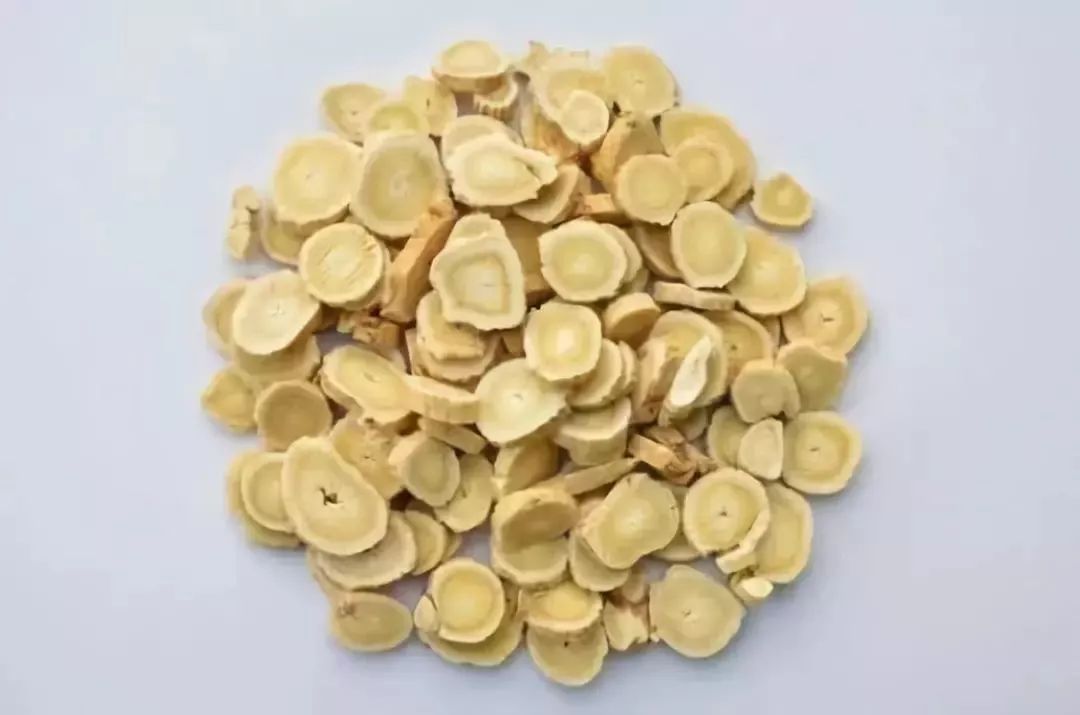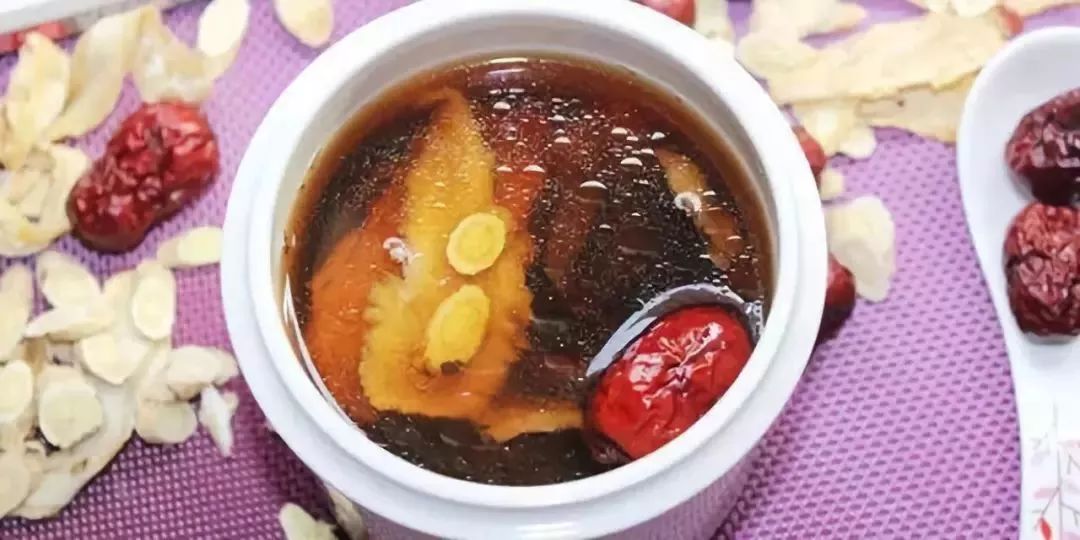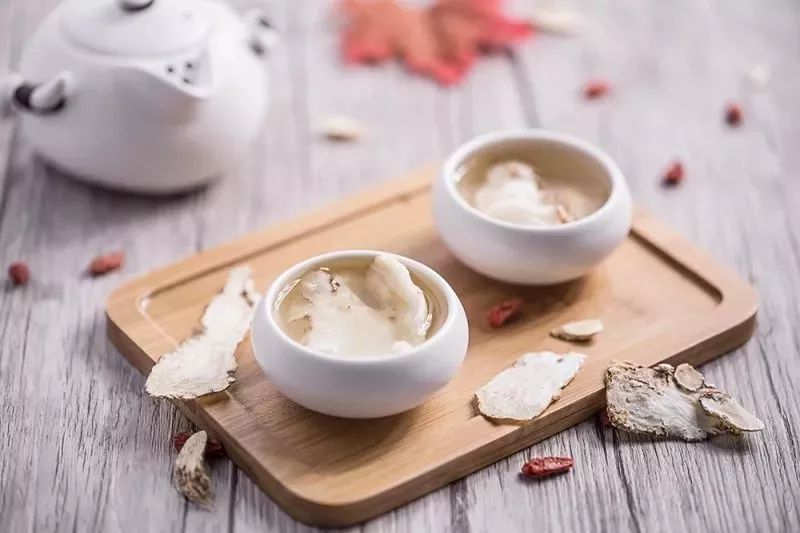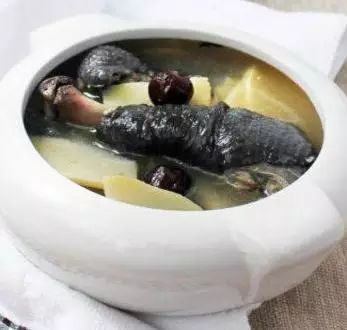
Astragalus (Huang Qi) is sweet and warm in nature, and is a commonly used herb for tonifying Qi. Traditional Chinese Medicine (TCM) believes that many functions of the human body rely on “Qi” to be accomplished. Qi can promote physiological activities, often referring to the physiological functions of various organs; it has a protective role for the body surface, defending against external pathogens, meaning that those with Qi deficiency are more prone to illness; it has a consolidating effect, controlling bodily fluids, and those with Qi deficiency may experience excessive sweating; it also has a transformative function, promoting the functions of essence, Qi, blood, and semen. TCM holds that Qi deficiency can lead to many conditions, such as susceptibility to colds and excessive sweating; Qi deficiency can lead to blood stasis, which often results in cardiovascular diseases; those with Qi deficiency are prone to bleeding, known as “Qi not holding blood”; Qi deficiency can lead to organ prolapse, referred to as “Qi sinking”; and those with Qi deficiency may experience limb swelling, known as “Qi rising causes water to descend”. Therefore, using Astragalus to tonify Qi can prevent and treat symptoms of Qi deficiency, enhance beauty, and strengthen the body.
1. The medicinal effects of Astragalus
1. Nourishes the Lungs Astragalus is slightly warm and enters the Lung meridian, and both ancient and modern practitioners regard it as a key herb for tonifying Lung Qi. It is mainly used for insufficient Lung Qi, weakened defensive function, and conditions such as colds, rhinitis, and cough due to external pathogens invading through a deficiency.Because it can enhance the body’s immune function, suppress abnormal immune responses, and improve disease resistance, it is particularly effective for conditions like allergic rhinitis, urticaria, bronchial asthma, and eczema, where normal immunity is low or abnormal. Key diagnostic points: recurrent skin rashes or susceptibility to colds, runny nose, cough, shortness of breath, and low voice.2. Tonifies the Middle Astragalus belongs to the Spleen meridian, its sweet flavor nourishes the Earth, and its warm nature promotes transformation, making it the first choice for tonifying the Middle and strengthening the Earth. It is widely used clinically for Spleen and Stomach deficiency, with symptoms such as stomach pain, diarrhea, and vomiting.Because it nourishes the essence and strengthens the organs, it can adjust and promote gastrointestinal function, thus having excellent efficacy for digestive diseases.Key diagnostic points: digestive system diseases accompanied by fatigue, abdominal distension, poor appetite, and loose stools.3. Raises Yang Astragalus is warm in nature, its Qi is light and ascending, and it is good at raising Yang Qi, mainly used for conditions where Yang Qi is sinking and cannot be raised, leading to organ prolapse due to the inability to transport and nourish the organs with the essence of food and fluids. From modern pharmacological research, its various nutrients can strengthen the body and promote organ function, thus having certain efficacy for conditions like gastric prolapse, kidney prolapse, and uterine prolapse.Key diagnostic points: examination shows various organ prolapse accompanied by fatigue, preference for warmth and pressure, thin and weak body, and weak pulse.4. Promotes Urination Astragalus tonifies the Middle, normalizing the central pivot, allowing for upward and downward communication, warming Yang and benefiting Qi, thus promoting the waterways of the San Jiao, which facilitates urination. It is mainly used for Qi deficiency, abnormal fluid metabolism, and Yang deficiency leading to inability to transform Qi and move water, such as in acute and chronic nephritis, mucinous edema, idiopathic edema, and liver- or heart-related edema. Notably, Astragalus has significant diuretic effects and can accelerate the disappearance of urinary protein, protect the liver, and prevent the reduction of liver glycogen, making it effective for nephritis and liver-related edema.Key diagnostic points: edema with pale skin, indentation upon pressure that does not rebound, fatigue, cold limbs, preference for warm drinks, and loose stools.5. Warms Yang Astragalus is warm in nature and has a strong ability to warm and tonify the original Yang, especially effective in warming and tonifying Heart Yang, mainly used for Heart Yang deficiency, which cannot effectively promote blood circulation, leading to palpitations, chest tightness, and Heart-related edema. This is because Astragalus can enhance myocardial contractility, improve heart function, and has a significant cardiotonic effect.Key diagnostic points: palpitations, chest tightness or pain, cold limbs, purple lips, and irregular pulse.6. Detoxifies (Promotes Tissue Regeneration) The Shennong Bencao Jing states that Astragalus “is used for abscesses and chronic non-healing wounds, expelling pus and relieving pain”; it has been referred to as the “essential herb for wounds” and is often used for abscesses and sores caused by Qi and blood deficiency, where pus forms but does not drain or does not heal after rupture, including conditions like peptic ulcers, chronic gastritis, oral ulcers, ulcerative colitis, Behçet’s disease, and skin diseases that do not heal after ulceration. This is because Astragalus can enhance the phagocytic function of the reticuloendothelial system and has inhibitory effects on cocci and bacilli, thereby enhancing local disease resistance and promoting healing of local lesions.Key diagnostic points: internal and external ulcers that do not heal for a long time, accompanied by fatigue, pale complexion, emaciation, pale tongue, and thin pulse.7. Activates Blood Circulation Astragalus is warm and good at moving, it can benefit Qi and warm Yang, promoting blood circulation and preventing stasis, thus having significant blood-activating effects. Clinically, it is mainly used for various conditions caused by blood stasis in the brain, such as transient ischemic attacks, vertebrobasilar insufficiency, and cerebral arteriosclerosis, leading to dizziness, headaches, and hemiplegia. Modern pharmacological studies have proven that it can stimulate the central nervous system, improve blood circulation, and promote the recovery of brain cell function, thus treating ischemic cerebrovascular diseases.Key diagnostic points: headaches, dizziness, hemiplegia, accompanied by numbness of the limbs, purple lips and tongue, and weak pulse.8. Consolidates and Astringes Due to its strong Qi tonifying ability, Astragalus has good consolidating and astringent effects, controlling the leakage of blood and bodily fluids. It is commonly used for bleeding and excessive fluid loss due to Qi and blood deficiency, such as chronic bleeding from organs, diabetes insipidus, nocturnal emissions, spermatorrhea, spontaneous sweating, and night sweats. Modern pharmacological studies have shown that the components in Astragalus, such as glucuronic acid and various amino acids, have strengthening effects and can supplement the protein components lost due to spontaneous sweating and block the secretion pores of the skin, inhibiting excessive sweating, thus having a sweating-stopping effect.Key diagnostic points: various chronic bleeding, night sweats, spontaneous sweating, frequent urination, nocturnal emissions, accompanied by pale complexion, fatigue, poor appetite, pale tongue, and thin pulse.9. Generates Blood The Bencao Gangmu states that “Astragalus is sweet, warm, and pure Yang, with five uses, including… activating blood and generating blood…” It is commonly used for blood deficiency due to various causes, such as anemia from different origins and decreased blood cells after chemotherapy for malignant tumors. This is because Astragalus can promote the proliferation of normal progenitor cells in the bone marrow, and the folic acid contained in Astragalus is essential for red blood cell synthesis, thus Astragalus can generate and nourish blood.Key diagnostic points: pale complexion, palpitations, dizziness, fatigue, pale lips and tongue, and weak pulse.10. Stops Thirst The Beilu states that Astragalus “supplements the deficiencies of men, alleviates fatigue, stops thirst, relieves abdominal pain, and diarrhea, benefits Qi, and promotes Yin Qi”; clinically, it is used to treat the weight loss and thirst associated with diabetes, showing certain efficacy, as Astragalus can adjust the immune state of the body, suppress abnormal immune responses of the pancreas, and lower blood sugar.Key diagnostic points: weight loss, thirst, dry mouth, cold intolerance, pale tongue, white coating, and thin pulse.11. Induces Sweating Astragalus can benefit Qi and nourish blood while promoting Yin Qi, and it can also elevate Yang Qi, thus it can supplement the source of sweat to induce sweating. Clinically, it is often used for Qi and blood deficiency, external invasion of wind-cold, where sweating cannot occur, and for conditions caused by imbalance of Yin and Yang, leading to dysfunction of sweat glands, such as in cases of weak body with colds, autonomic dysfunction, and Sjögren’s syndrome.Key diagnostic points: severe chills, fever without sweating, fatigue, dry mouth, dry skin, cold limbs without sweating, and thin pulse.12. Expels Bi Syndrome Astragalus is warm in nature, it moves rather than stays, reaching both inside and outside, it can warm the meridians, activate blood, and open the collaterals, thus having the ability to dispel wind, scatter cold, and eliminate dampness. It is widely used clinically for various wind-cold-damp Bi syndromes, such as joint pain from arthritis, muscle pain, and neuralgia due to Qi and blood deficiency, invasion of wind-cold-damp evil, and blood stasis obstructing the collaterals.Key diagnostic points: muscle and joint swelling and pain, numbness accompanied by weakness and fatigue, cold limbs that feel better with warmth, pale tongue with white coating, and deep, thin, weak pulse.
2. The main health benefits of Astragalus
1. Improves the sub-healthy state of physical fatigue.
Astragalus has the effect of enhancing physical fitness, and in TCM, it is believed that drinking Astragalus water regularly can improve mental state, gradually alleviate shortness of breath, and effectively enhance the body’s immunity to prevent colds.

2. Enhances myocardial contractility.
Taking Astragalus not only strengthens the body but also enhances myocardial contractility, effectively preventing heart failure in blood circulation.
3. Prevents and treats hypertension.
Many patients with hypertension, especially the elderly, are prone to lower body edema. Drinking Astragalus water can effectively eliminate edema and lower blood pressure.
Master Dengtiaotao, a master of traditional Chinese medicine, believes:
a 、Astragalus can not only lower blood pressure but also raise blood pressure; the difference lies in the dosage: generally, a light dose of Astragalus raises blood pressure (≤15 grams), while a heavy dose lowers blood pressure (≥30 grams).
b 、At the same time, for conditions of internal heat hypertension, liver Yang hyperactivity, fullness, and red tongue coating, this condition of Yin deficiency and heat will be counterproductive with Astragalus, so caution is advised!
4. Alleviates iron deficiency heart disease.
If a patient has iron deficiency heart disease, then taking 50 grams of Astragalus boiled in water daily, divided into three doses, can promote recovery and effectively alleviate angina symptoms.
5. Improves edema in diabetes.
Generally, diabetic patients often experience edema and a waxy complexion; regularly drinking Astragalus with kudzu root can eliminate edema and improve Qi and blood, giving a rosy complexion; if ulcers occur, adding red peony and salvia can help reduce inflammation and detoxify, enhancing the effect.
6. Alleviates symptoms of osteoporosis.
Patients with osteoporosis can try Astragalus and cinnamon twig decoction, which can effectively relieve back pain. This decoction can also effectively treat skin inflammation, peripheral neuritis, and post-stroke sequelae with symptoms of limb numbness and pain.
❑ Astragalus and Cinnamon Twig Decoction
Astragalus 10-15 grams, cinnamon twig 10-15 grams, white peony 10-15 grams, fresh ginger 20-30 grams, 12 dates, decoct in water, take three times a day.

7. Prevents and treats chronic rhinitis.
By decocting Astragalus with Atractylodes and Fangfeng, or directly taking the Chinese patent medicine Yupingfeng granules, it can effectively treat spontaneous sweating, night sweats, allergic rhinitis, asthma, colds, and can effectively prevent chronic rhinitis.
8. Improves symptoms of Spleen Qi deficiency.
Prevention and improvement of Spleen Qi deficiency. Common symptoms of Spleen Qi deficiency include fatigue, shortness of breath, and excessive phlegm. Decocting Astragalus with Codonopsis, Atractylodes, and Poria can tonify the Middle, benefit Qi, and eliminate dampness and phlegm, revitalizing the spirit.
❑ Astragalus and Angelica Blood-Tonifying Soup
Astragalus and Angelica in a 5:1 ratio, brewed as tea, can tonify both Qi and blood.
This is a well-known and practical formula, the Angelica Blood-Tonifying Soup by the ancient physician Dongyuan, which consists of only two herbs, one being Astragalus and the other Angelica.
These two herbs combined in a 5:1 ratio have a strong effect on tonifying Qi and generating blood, making it very suitable for those with Qi and blood deficiency, and can be a health-promoting formula to drink regularly.

3. Precautions for taking Astragalus
Astragalus is a traditional Chinese medicine, and its properties are inclined towards warming and tonifying. While it tonifies Qi and raises Yang, taking it daily may lead to symptoms of internal heat, such as dry mouth, nosebleeds, etc. Therefore, it is best not to self-administer Astragalus and to take it under the guidance of a TCM practitioner based on individual needs, and it is not recommended to drink Astragalus water daily or to take too much at once.
The following situations should avoid taking Astragalus:
1. Those prone to internal heat should not drink it. If you are someone who often experiences symptoms of internal heat, such as frequent nasal inflammation, facial redness, irritability, nosebleeds, or oral ulcers, it is best to avoid drinking Astragalus water, as its warm nature may exacerbate these symptoms.
2. Women during menstruation should not drink it. It is best for women to avoid drinking Astragalus water during their menstrual period to prevent excessive menstrual flow, menstrual irregularities, or prolonged menstruation, which can adversely affect the body.
3. Those with kidney Yin deficiency, damp-heat, or severe heat toxicity should not drink it. Because Astragalus is warm in nature, it may worsen these conditions. Additionally, if you are currently experiencing a cold or fever, it is best to avoid drinking Astragalus water to prevent an increase in body temperature, which is not conducive to cooling down.
4. Pregnant women should not drink it. For women who are pregnant, it is best to avoid drinking Astragalus water to prevent miscarriage or a decrease in amniotic fluid in late pregnancy, which is not conducive to delivery.
4. Introduction to several dietary therapy recipes using Astragalus
Astragalus is a type of traditional Chinese medicine that is indispensable for daily health maintenance and treatment, often used in combination with herbs like Codonopsis, cinnamon twig, Ophiopogon, and black plum. So how should Astragalus be consumed?
1. Ginseng, Astragalus, and Jujube Porridge
Ingredients: Codonopsis 20 grams, Astragalus 15 grams, 10 jujubes, 100 grams of rice.
Method: Cook Codonopsis and Astragalus over low heat for 40 minutes, strain the herbs, then add rice and jujubes to cook porridge. Take one dose daily, divided into 1-2 servings, for a 7-day course.
Effect: It has the effect of tonifying the Spleen and benefiting Qi, harmonizing the middle. It is used for Spleen deficiency with weak Qi, fatigue, cold limbs, spontaneous sweating, reduced appetite, or susceptibility to colds.

2. Angelica, Astragalus, and Black Chicken Soup
Ingredients: Black chicken meat 250 grams, Angelica 15 grams, Astragalus 20 grams.
Method: Clean and cut the black chicken into pieces, wash the Angelica and Astragalus, then place all ingredients in a pot, add an appropriate amount of water, and simmer until cooked. Season to taste and serve. Take a small bowl each morning and evening.
Effect: It has the effect of tonifying both Qi and blood, consolidating the kidneys and regulating essence. It is suitable for menstrual disorders due to Qi and blood deficiency, irregular menstruation, and light menstrual flow. Long-term consumption can harmonize Qi and blood in women, making the skin smooth, white, and radiant.
3. Astragalus and Cinnamon Twig Decoction
Ingredients: Astragalus 9 grams, cinnamon twig 9 grams, white peony 9 grams, fresh ginger 18 grams, 4 jujubes.
Method: Wash all ingredients and decoct in water, take warm, three times a day.
Effect: It has the effect of benefiting Qi, warming the meridians, and harmonizing blood to relieve Bi syndrome.
Astragalus Lung-Tonifying Drink
Ingredients: Astragalus 30 grams, Ophiopogon 15 grams, Schisandra and black plum each 6 grams.
Method: Decoct the herbs in water, then sweeten with honey and take orally.
Effect: It has the effect of tonifying the kidneys, consolidating the lungs, nourishing Yin, moistening the lungs, benefiting Lung Qi, and consolidating the exterior. It is suitable for Qi deficiency with Yin injury, spontaneous sweating, thirst, and persistent cough.

